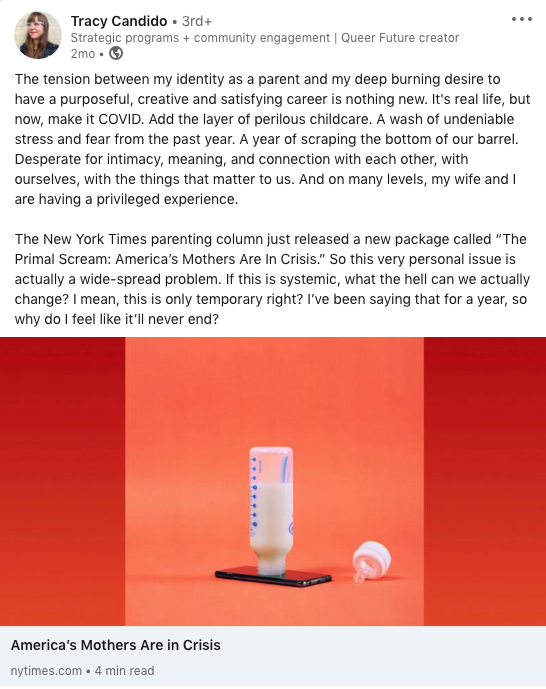After months of working from home while looking after two children, Sarah Hesz made a great escape.
“I’m on my way into the office for the first time since the pandemic began,” Hesz told Sifted while commuting across London. “I’m so excited to just sit with a cup of coffee and work in peace and quiet.”
Like many other parents across the world, Hesz, who is chief commercial officer at childcare startup Bubble, is feeling the impact of school and nursery closures. She says mums and dads “just can’t get anything done” at home, while their young children pester them for snacks, and wander around in the background of their Zoom calls.
The toll the crisis is taking on the mental health of working parents — “who feel like they are being pulled in different directions” — is not to be understated, says Tina Nayak, who is in the throes of building her own business while caring for her teenage daughter.
Recent reports show that women are still handling the majority of the childcare in heterosexual partnerships, with alarming results.
According to a global survey from consultancy firm Deloitte, 82% of working women say the pandemic has impacted their work-life balance and affected their physical and mental health. 70% of women impacted by these disruptions expressed concerns that their career progress would be slowed as a result.

“I was talking to a friend [who is a working mother] recently who told me she doesn’t feel safe in her job, as she’s worried her manager will think she’s not being productive at home. She’s working extra hours just to make sure she’s visible,” says Nayak.
“It’s already stressful in the workplace, and not having proper support for childcare multiplies that manifold.”
The struggle
For parents of young children, finding adequate childcare — especially between the ages of zero to three — is often a struggle with limited and expensive options, says Brett Wigdortz, father of two and cofounder of tiney, a digital startup offering preschool education and childcare in London.
UK childcare, for instance, is some of the most expensive in the world — and state support in most cases is not accessible until your child turns three.
In Germany, public daycare centres which are either partially or wholly subsidised by the state are also on offer, but they’re often oversubscribed with huge waiting lists.

“Businesses have an opportunity to step up and fill the gap when it comes to childcare support as governments have a lot of work to do,” says Hesz.
While startups have historically been quicker to implement “free drinks allowances and health perks” rather than policies for working parents, continues Hesz, Covid-19 has brought about a change in attitude.
“Businesses are now waking up to the fact that investing in childcare support delivers real return on investment — especially in terms of productivity and staff retention.”
Indeed, a study from the US Chamber of Commerce Foundation found that when companies provide childcare support, employee absences can decrease by 30%, while job turnover can decline by 60%.
And when it comes to helping women enter and remain in the workforce, supportive child care policies can help with that too.
So, what can startups be doing to support parents?
Sifted spoke to a number of working mums and dads — many of whom run their own companies — across Germany, France, and the UK to hear their thoughts.
Offer subsidised childcare
In an ideal world, startups with the available budget could offer employees subsidised childcare, says Wigdortz. This could involve covering the cost of a babysitter or a daycare centre.
“Parents need flexible childcare from a provider they can trust. No one can focus on work if they’re worried about the safety of their child,” adds Wigdortz, who founded TeachFirst, the largest graduate recruiter in the UK, prior to tiney.
tiney, for example, offers its employees £5k worth of free childcare per year, which they can spend on one of the childminders from its network.

Over in France, companies have begun to build partnerships with private nursery chains, such as people&baby, which they then refer to their employees. The companies subsidise the cost.
“It’s a great initiative,” says Sophie Guibaud, chief growth officer at UK-based fintech OpenPayd, who has two young daughters and commutes between Bordeaux and London for work.
“The French government has created incentives for companies to want to subsidise childcare because [the companies] can get tax credits,” she adds.
Berlin-based language app Babbel has an ongoing cooperation with the FRÖBEL-Gruppe — an organisation with several daycares in Berlin — which offers highly-coveted daycare places to Babbel employees.
“This is especially useful for parents who come from other countries, who aren’t familiar with the system and who don’t speak German,” a representative from Babbel told Sifted.
Before Covid-19, Babbel also had a cooperation with the coworking space JuggleHub. The organisation offers parents the opportunity to work while having their children looked after next door — all paid for by Babbel.
Give paid family leave
Paid special leave days can be a relief for parents when unexpected things crop up — such as taking an ill child to the doctors, or caring for an elderly family member.
In Berlin, startups such as Babbel offer unlimited paid special leave days, which can be taken in addition to holidays and child sick days. In Germany, each parent can claim 10 child sick days per child per year. This allowance has increased to 20 days per child for 2021 in light of Covid-19.
“The idea is to not have employees use their holidays to match the lack of childcare. Holidays should be taken to recharge and relax,” says a Babbel representative, who is also a mother.
Berlin-based proptech Wunderflats offers parents the opportunity to reduce their working hours from 40 to 32 — with their salary decreased proportionally.
The company tries to be as flexible as possible to accommodate all employees’ work and lifestyle preferences, says its CEO Jan Hase, and is particularly mindful of how “exhausting” it often is to be a parent.
“We try to make each individual’s work environment inspiring and motivational, and sometimes, life just happens outside of Wunderflats.”
Allow flexible work hours
Not all companies can afford to give their employees monetary childcare benefits — especially early-stage, cashstrapped startups, say the founders Sifted spoke to.
“The bare minimum that companies could offer is flexibility in working hours,” says Boris Borisov, founder of Berlin-based recruiting startup Remote More, as he pulls his wailing baby onto his lap.
“It’s a good idea for this to be agreed at the start of the week, so the team is coordinated about when people won’t be available,” adds Borisov, whose company currently doesn’t have an official childcare policy but offers parents as much flexibility as needed.
Many team members have kids at home with them, and it’s no stress to have them say hi on video calls or interrupt.
Fundingport, a Berlin-based company providing financing for sustainable energy projects, also doesn’t have a dedicated childcare policy. However, it tries to make its working environment as “kid-friendly” as possible, says the company’s head of product Merissa Silk.
“Many team members have kids at home with them, and it’s no stress to have them say hi on video calls, interrupt, or have parents skip some meetings to cover childcare.”
Enable asynchronous work
Startups also need to get more comfortable with asynchronous work rather than operating around a rigid nine-to-five schedule, says Nayak, who currently wakes up at 4:30am so that she can get a “good chunk” of work done before her daughter wakes up for homeschool.
Some startups in Europe have begun frontloading team meetings to the morning when most children are at daycare, to ensure all employees are up to date with company proceedings.
Other startups with distributed teams have found different solutions.
For example, Rasa, a software company with offices in San Francisco and Berlin, has to schedule many team events after 5pm CET. On these occasions, the company covers the full cost of a babysitter for each employee.
“However, we are looking into reducing team meetings to a bare minimum and also recording meetings for employees who can’t be there,” says Viktoria Klianeva, Rasa’s organisational development manager.
Have open communication
In addition to offering benefits, those at the helm of startups need to encourage open conversation around the needs of working parents — right from the beginning of an employee’s contract.
“Companies need to be mindful about what it really takes to become, and be a parent, and create a safe environment for discussion,” says Guibaud.
“My path to becoming a mum took three years and, in my former company, I had to hide myself to conceive my babies because I was worried about losing my job.”

Adrien Cipel, global head of the insurance vertical at AI company WorkFusion, says that employers looking to develop good childcare policies should simply ask parents what they need.
“Employers should ask working parents, ‘what is the ideal setup for you to give your optimal contribution to the company?’. This should be a natural question, but very few companies are actually asking this right now,” says Cipel, adding that working from home isn’t even a “developed concept” in France — let alone instituting childcare policies.
Rasa has a number of systems in place to encourage dialogue between employer and employee.
The company has a DEI working group where parents can “be vocal about their needs and actively give feedback on the company’s processes,” says Klianeva.
Beyond offering any benefits, it’s crucial that companies create empathy for parents in their teams.
Additionally, Rasa has a parents’ Slack channel where people can share their experiences and exchange ideas.
“Beyond offering any benefits, it’s crucial that companies create empathy for parents in their teams,” says Guibaud. “I’m so vocal about this because I want to decrease the pressure mostly women feel about becoming a parent — because it’s freaking difficult. But, if nobody talks about it publicly, then no one will know we’re struggling.”
It’s in the interest of startups themselves to offer childcare benefits — especially when it comes to hiring talent.
Nayak says that monetary or non-monetary childcare perks could give startups a competitive edge in a post-Covid world.
“I think the startups that are really going to succeed long-term are those that can think ahead when it comes to childcare policy.”
“[Considering] this will not only help startups differentiate themselves from others, but it will help them build longer-lasting relationships with their current and future hires.”
Miriam is Sifted’s Germany correspondent. She tweets from @mparts_



